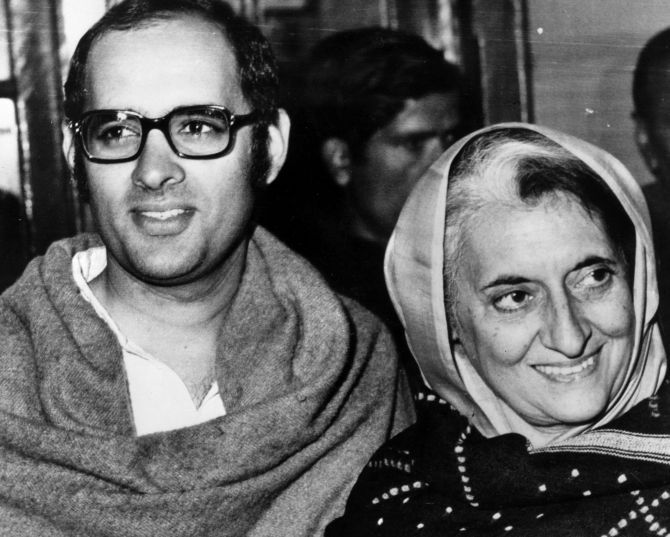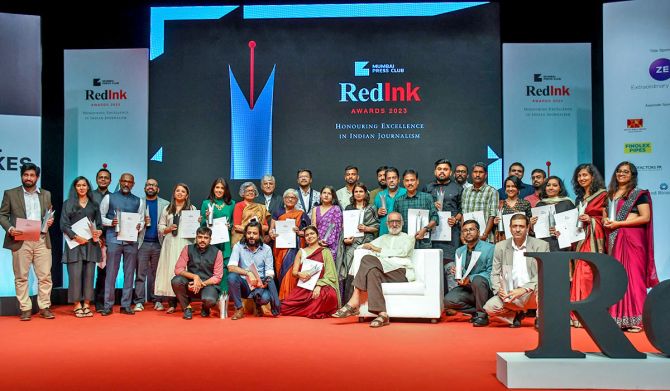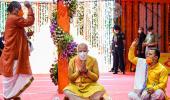'The BJP is trying to change this mantra.'

On December 30, freedom fighter Dr G G Parikh, who was jailed during the 1942 Quit India movement and again during the Emergency, turns 100.
In a long interview capturing his life and times, GG, as he is called, spoke to Jyoti Punwani. In the second part of the interview, he talks about life after Independence, his work at the Yusuf Meherally Centre and his experiences during the Emergency. A must-read interview.
- Part 1 of the Interview: 'Those days, 'jail-returned' was like 'foreign-returned', something to aspire for'
How long did the euphoria of Independence last, before disillusionment set in?
Our role during the freedom movement was so great that the euphoria remained a long time.
At the same time, personally I felt the leadership betrayed Gandhi. We had been told that after Independence, rulers would be the servants of the public. But they started imitating the British. That was the first betrayal.
It's not that we turned anti-Nehru, but we felt bad that Gandhi was forgotten so soon.
Even the development model was different from what Gandhi wanted. Nehru had always been in favour of big industry, unlike Gandhi.
At that time, Socialists were not opposed to industrialisation. For us, ownership was important. We assumed that as long as industries are nationalised, things will automatically change. History was on our side, we thought, samaajwaad annewala hai. Agriculture, industry, then the service sector -- these were the stages of development according to Socialism too.
What we forgot was that this was not a God-given rule, but a man-made one. It could be changed had we had the will. In the tussle between will and matter, matter prevailed, while for Gandhi, will always prevailed.
We realised that just because ownership changes, it doesn't mean that man also changes. That's one of the reasons I concluded that Gandhi's method -- of changing people -- was correct.
But you did try an alternate model of development at the Yusuf Meherally Centre at Tara.
At the Centre, we studied urbanisation and concluded that in the Third World, the problems of the city could only be solved in the hinterland. 50% of the urban population in all Third World countries live in slums, so you have to find a way that slums don't come into being.
But the type of urbanism that was being promoted to build a market for the West would never allow cities to be slum-free, hence rural development was a must.
We realised that the pattern of economic development adopted by us would not generate jobs for rural people. We had to go back to Gandhi; deploy local resources.
At Tara, we experimented a lot. We promoted alternate building materials -- at that time, Laurie Baker was very popular; we tried to solve the problems of small and marginal farmers. We got S A Dabholkar (educationist and agriculture researcher) to help. A new experiment was done to enable a farmer owning just one-fourth acre of land to live a decent life. We started organic farming.
We set up a dairy. Realising it was too expensive to maintain exotic breeds of cattle, we experimented to find out whether a dairy could be kept going with the help of cow dung. We implemented `waste to wealth' and set up a bio gas plant.
We did all this decades ago!
For non-farm employees, we tried to see if village industries could work. But markets for the goods produced became a problem.

Were funds a problem?
Initially, we thought we'd take just enough to run the place. That was Gandhi's influence on us.
Later, we started collecting more funds, but without compromising. A German who used to help us offered to become a donor if we stopped village industries. That's when we decided we'd rather forego his help and raise our own income.
Was there any resistance from the villagers to you town people coming there?
Not resistance, but we encountered problems.
There were a lot of bonded labourers when we started work. We worked with them, but that antagonised the farmers for whom they worked.
We worked among women. We trained 100 women for a year, telling them you need to be self-sufficient. But when we started a small industry, only 9 of them signed up and then only 3 came!
Our experiment trying to get Adivasi workers to stop working long hours at brick kilns and instead, work for us, also didn't quite work out. We finally realised that we shouldn't work for a section, but for everybody.
Then there were cultural practices of the villagers. To get over them was hard work. We realised that rural society is divided, but becomes one against outsiders. To get acceptance for our urban volunteers required a lot of effort.
But we kept learning. For instance, the collector gave us a dilapidated dharamshala for medical work. We took it, but in the name of the panchayat. We decided that whatever we do, the ownership should be local. That helped.
Today we've become part of the villagers. We run a free school, and students are picked up from home and dropped back in our bus. We run a free hostel for Adivasi girls, one of the best in Maharashtra. Our hospital is heavily subsidized.
We have also been running Sagar Shalas on the coast for children of salt pan workers and fisherfolk.
That's a lot!
Yes, but our weakness is not being able to function as an advocacy group. We haven't been able to promote the idea that people must pressurise the government to do all this, that panchayats must provide free education, that it's the duty of the government to provide subsidised housing and free health care.
We're doing what the government should be doing. We've failed to create that spirit in the beneficiaries to demand this of the government.
Has the government helped at all?
When Sharad Pawar was CM, he sanctioned a 12 lakh grant for our hospital. We used to get a grant for school expenditure, but that stopped.

You went to jail during the Emergency too. How was that experience different from your 1942 jail stint?
During the Emergency, when the police came to arrest me, I found they had every type of information about what I'd been doing.
That's when I realised the difference.
In 1942, people would get beaten but not give out anything. Jagdish Ajmera (the Socialist who later became leader of the Railwaymen's Federation) ended up with a limp because despite the police beatings, he didn't reveal what he was doing.
But in the resistance to the Emergency, that sort of character wasn't there.
In the freedom movement, you had to be mentally prepared to go to jail. You had to fight for everything, face a lot of hardship, even beatings. Yet, our morale remained high.
So many people had gone to jail in the 1930s. We knew their experiences. They had told us about the 3rd degree methods used by the police. So we were mentally prepared to get beaten but not answer the police's questions.
People had forgotten this spirit in the JP movement. That training wasn't there. A few did have the necessary character, such as Mrinal Gore.
Still, I found the Socialists were better prepared to face jail than the RSS (Rashtriya Swayamsevak). The RSS kept on apologising.
(Madhukar Dattatreya 'Balasaheb') Deoras (RSS Sarsangchalak from 1973 to 1994) was with me in Yerwada jail then. I sensed that he and the RSS people had not anticipated going to jail. Baahar kaise bhi jaana hai, (we have to get out anyhow) that was the thought in their minds always.
I don't think they read anything in jail beyond the Gita, while we read everything. Professor G P Pradhan (editor of the Socialist magazine Sadhana and English professor in Ferguson College) would take classes on all kinds of topics.

How were you treated in jail?
In Yerwada, because we were away from Delhi, the fear of Indira Gandhi was less. So the jail officials were sympathetic. Actually even in 1942, the officers were pro-freedom but they had to do certain things as part of their job.
The Jayaprakash Narayan movement is blamed for bringing the RSS into the mainstream.
JP sincerely thought he could change them. People forget that earlier, he had tried to change dacoits (200 dacoits, including those carrying rewards on their heads, surrendered thanks to his persuasion in 1972) and Naga militants. But he failed in changing the RSS.

The way communal thinking has surfaced today, makes us wonder whether not enough attention was paid to countering it post-Independence.
Because of the influence of Marx, we believed that religion was an opium. We neglected the importance of religion in changing man, and also of reformists who worked hard to change man.
One of the main aims of the Yusuf Meherally Centre was to promote communal harmony. We called it the unfinished task of the freedom movement.
But we made one mistake -- in a plural society, the leadership must also be plural. The face of every institution in a plural society should represent plurality. Socialist institutions didn't throw up a composite leadership. No political party succeeded in doing so either.
Gandhi gave us this mantra -- unity in diversity, but we didn't take it to its logical end. This mantra has helped us survive and it is this the BJP is trying to change.
Where we have failed is in being able to connect with Hindus; and in convincing Muslims to talk of communities other than their own. Whether majority or minority -- both must work for all.
Nehru did try to work towards communal harmony, so did the Socialists. In communal riots, the role of Socialists wasn't too bad. (Ram Manohar) Lohia was there with Gandhi in Kolkata.
- Part 3 of the Interview: 'Today Is Worse Than British Times'
Feature Presentation: Aslam Hunani/Rediff.com











 © 2025
© 2025